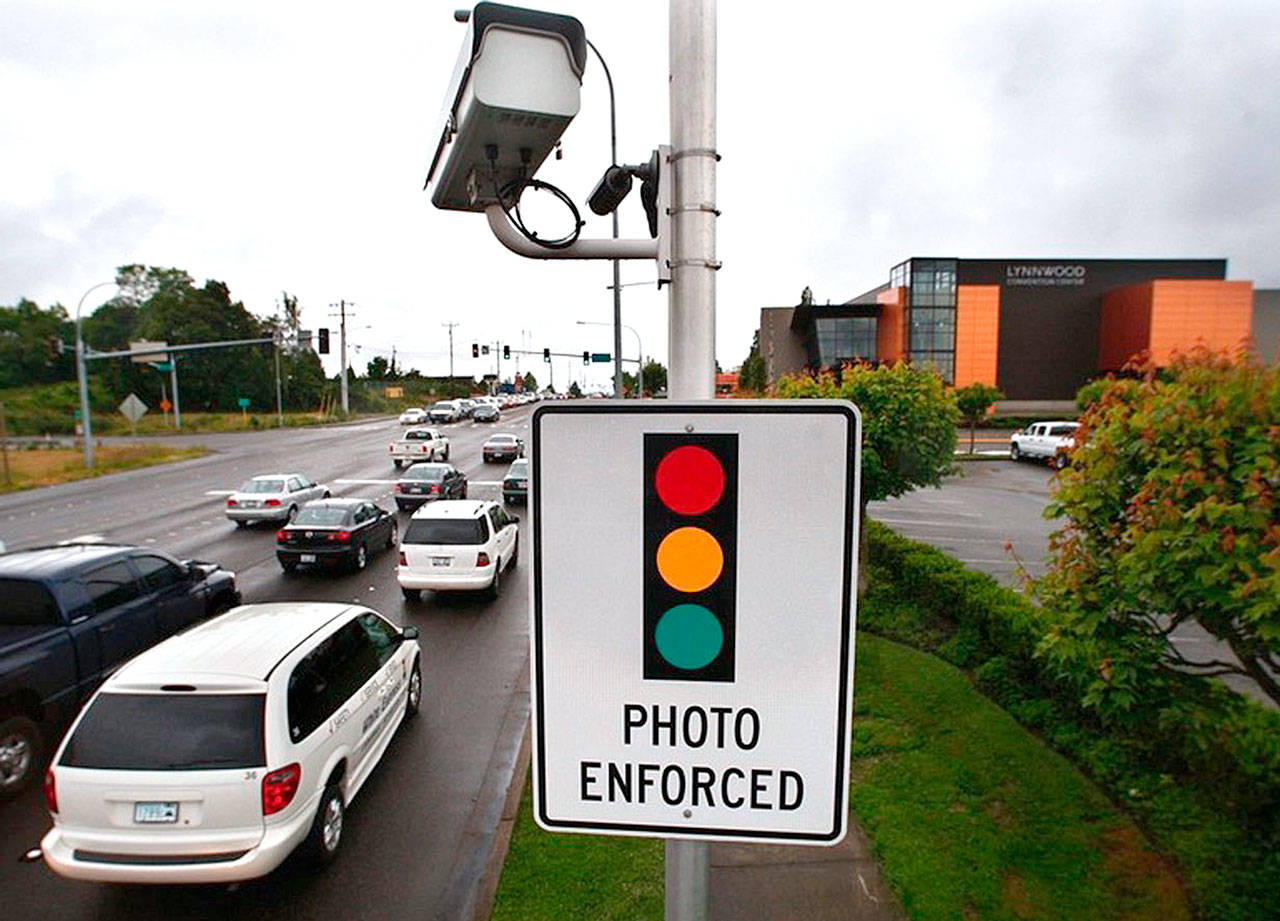By The Herald Editorial Board
Ten years ago, the City of Everett was moving along with a proposal to install “red-light” cameras at a number of intersections in the city along with a camera in a school zone to catch speeders. A contract with a vendor was all but signed before a lawsuit in King County put up a yellow light on the idea.
What’s happened in the decade since? Lynnwood, the only Snohomish County city using the traffic enforcement cameras — after much debate — renewed its contract with its camera vendor this April for another five years and is now one of 20 cities in the state using the cameras to issues fines to drivers who ignore red lights or speed limits in school zones.
In Everett, unless witnessed by an officer, drivers are still running red lights and speeding in school zones without fear of a ticket.
Noting continuing collisions at city intersections studied previously as potential camera locations, Everett officials have revived the proposal, with the City Council potentially considering the issue in January, reports The Herald’s Ben Watanabe.
If adopted, the cameras could go up relatively quickly. The city’s ordinance, adopted in 2009, is in place and still conforms to state law for cities considering the cameras. And city engineers have reviewed the locations first considered and stuck largely with the original list.
The automated cameras could be placed at northbound Rucker Avenue at Pacific Avenue; eastbound Pacific at Rucker; southbound Evergreen Way at Madison Street; northbound Evergreen Way at E. Casino Road; eastbound Casino at Evergreen; southwest bound Evergreen at Fourth Avenue W.; and Evergreen Way at the westbound High 526 off-ramp.
Additionally, Casino Road near Horizon Elementary School would get speed-zone cameras.
The cameras have earned a reputation as an “all-seeing” traffic cop, and one that isn’t going to listen to excuses and let drivers off with a warning. After the video evidence is reviewed by an officer, the registered vehicle owner is sent a fine — under the Everett ordinance, up to $250 — which can be paid or challenged before the city municipal court. The good news for those caught: Your insurance company won’t see the infraction on your driving record.
It’s also common to hear the cameras criticized as an easy way for cities to rake in revenue.
And they do. In 2017 and 2018, Lynnwood issued about 34,000 camera tickets each year. For 2018, that city’s 16 cameras brought in $3.4 million, of which $600,500 went to the camera vendor, American Traffic Solutions.
However, by state law, municipalities are limited in how they can use the revenue collected through camera-enforced traffic tickets. Beyond payments to the vendor, the revenue has to go toward traffic safety enforcement or traffic improvements, such as crosswalks and signals.
What is increasingly certain is that the cameras are effective in reducing injuries, deaths and property losses in accidents and can change the behavior of drivers trying to beat the light.
Admittedly, there’s a trade-off regarding accidents. While traffic cameras are effective in limiting the number of right-angle — or “T-bone” — accidents, some studies have shown an increase in rear-end accidents, with drivers stopping quickly and being hit by vehicles following too closely. But even accounting for the increase in rear-end wrecks, the statistics show an overall decrease in injuries and in property losses.
“That’s a trade a traffic engineer is always going to want to make,” said Everett Public Works Director Ryan Sass at an Oct. 9 city council public safety committee meeting.
A 2005 Federal Highway Administration study found that, even with an increase in rear-end accidents, each intersection where cameras were used showed an average decrease in property losses of between $40,000 and $50,000 annually, because of the decline in more serious right-angle crashes.
The Centers for Disease Control and Prevention cites studies that similarly showed decreases in rates of fatal accidents. A 2011 study looked at fatal crashes in 14 U.S. cities with red-light cameras and 48 cities without. Fatal accidents decreased 35 percent in cities using the cameras, for the years studied, even as they decreased 14 percent in cites without the cameras.
Importantly, a review of statistics from New York City and Chicago which have used the cameras since the early 2000s, show a drop in the number of tickets issued as drivers become accustomed to the cameras.
Use of the cameras also was recommended in this year’s update of the state’s Target Zero campaign to reduce traffic fatalities. The update says use of the cameras have been shown to reduce overall crashes by 20 percent to 25 percent. And with increased use in the state, it estimated that annually 21 lives would be saved, 17,000 injuries would be prevented and nearly $68 million in property damage would be avoided.
After a decade’s delay, Everett should move ahead with its plans for the cameras.
Talk to us
> Give us your news tips.
> Send us a letter to the editor.
> More Herald contact information.

























